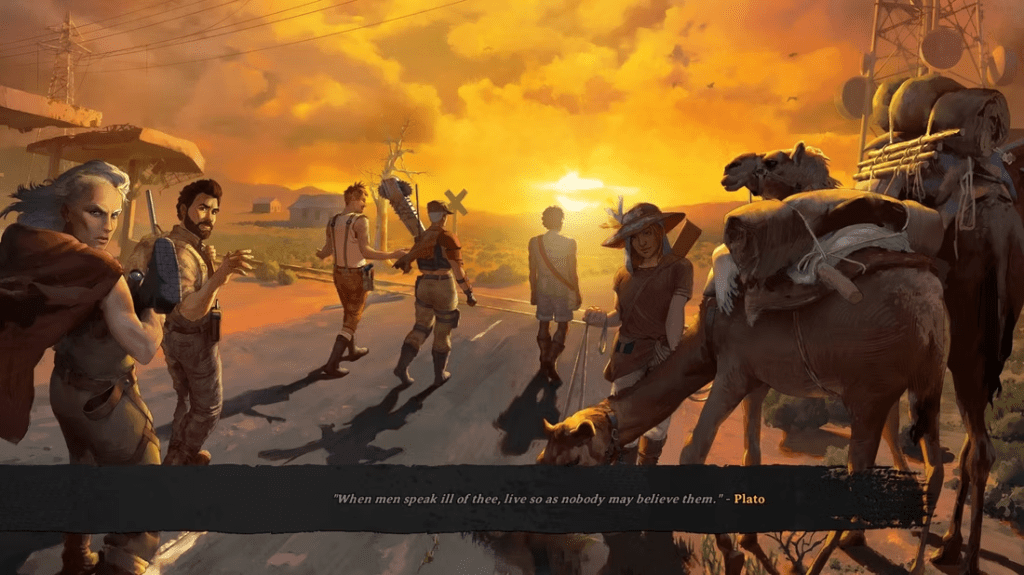
Platforms: PlayStation 5, Nintendo Switch, PlayStation 4, MORE
Publishers: Versus Evil, tinyBuild, Team17
Mode: Single-player video game
License: proprietary license
Genres: Role-playing video game, Adventure game, Strategy video game
Developer: Drop Bear Bytes
Developer Drop Bear Bytes is aware that the 1990s were the CRPG’s prime years. From the beginning, it is evident that Broken Roads is an independent game attempting to tap into the popularity of comparable role-playing games, such as Disco Elysium, Fallout, or Wasteland, but on a much smaller scale. The question is whether the ambition of this Australian-set drama surpasses its capacity for fulfillment, and how well does it stack up against great genre legends.
It’s certainly ambitious. The popular moral compass, which has four quadrants representing nihilist, utilitarian, Machiavellian, and humanist viewpoints, could make role-playing exciting. You answer a questionnaire at the beginning of the game to reveal your preferences for handling different scenarios. Would you flee alone, leaving a group of captives behind? Would you leave the defenseless family on their own and bring only the useful ones? Each response directs you to a certain quadrant and provides you with a preview of the dialogue options that will become available in the game. That is, at least, the concept. The execution is significantly less satisfying, as you’ll find out.
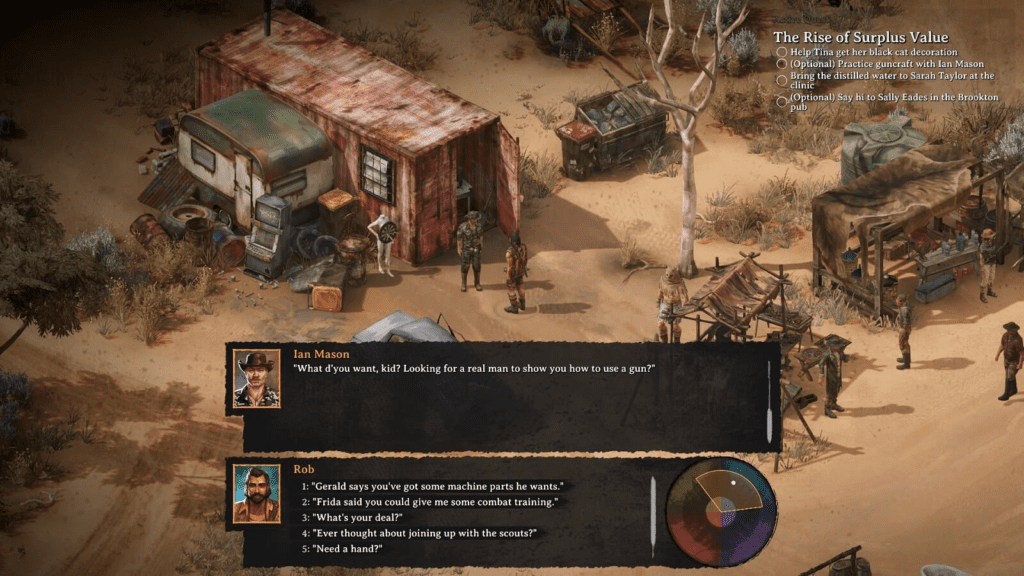
A therapist is needed by someone.
The plot opens slowly but recognizable: you are a post-apocalyptic survivor in a harsh Outback setting, and the genesis tale you receive will vary based on the character archetype you choose. In my instance, I was a surveyor who showed up in a run-down town to be driven to another town by a few residents. There are only a few minor locales in the beginning, maybe three to five NPCs to start off with full discussions and a few more background actors. I gained knowledge about the fundamentals of fighting (which, after finishing Baldur’s Gate 3, feels like going from algebra to times tables). More importantly, even though the game kept trying to divert my attention with its poor polish, I came to know and enjoy the characters.
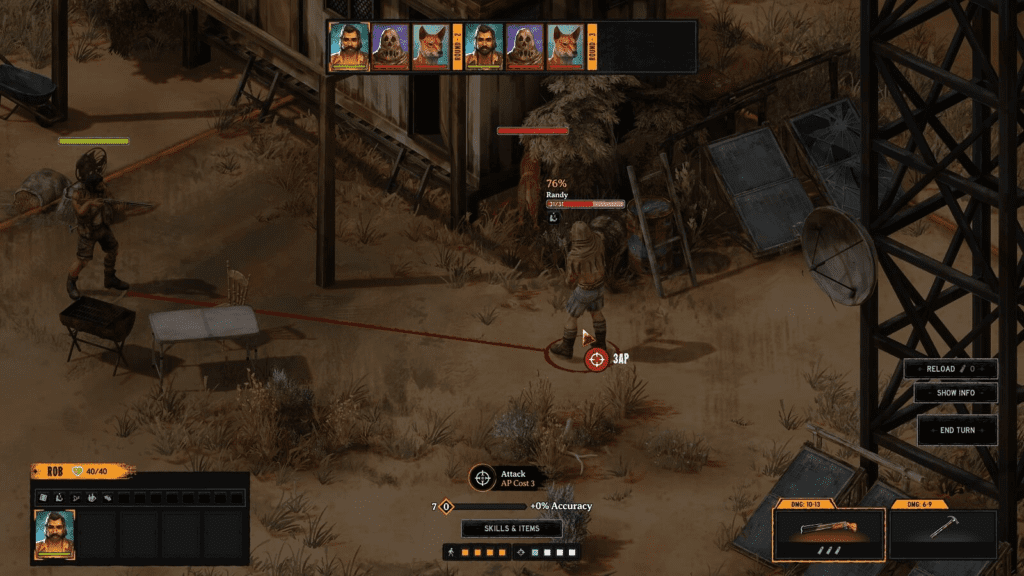
There may have been a little more enthusiasm in combat.
You choose to move with the survivors and assist them in their new location rather than returning home after the town you’re in is attacked and many of its residents are killed. I’m not sure why I did this, but because I spent the majority of the game solidly in the Humanist camp, it felt like a reasonable moral alignment for my character. During the game, other survivors will join and leave your group. Although vague, their characterization is well-founded. There are only a few worn-out, shell-shocked people attempting to survive—neither large nor little in personality.
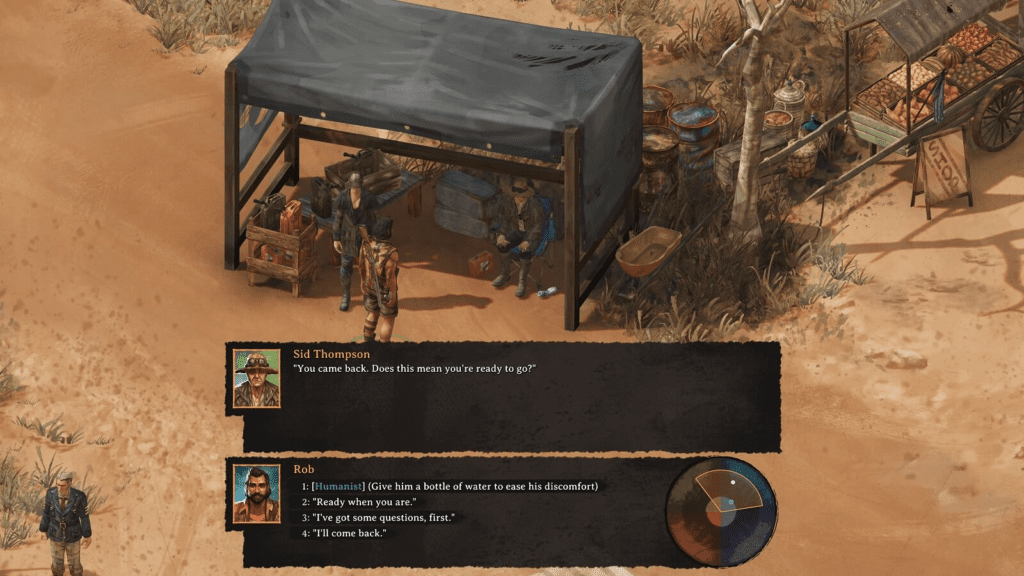
When moral options come up in discourse, it seems like they have little effect
Combat is adequate but significantly less fascinating, taking cues from games like Wasteland and XCOM. All that your group can do is move around using movement points, attack, and utilize action points to activate goods or skills. The game doesn’t fully explain flanking or hiding, and the abilities available to your characters (such the accuracy help Deadeye) are either extremely rare to employ or significantly less potent than using your action points on more commonplace strikes. Enemy AI seems to have been tuned mostly for attack, with minimal subtlety. I discovered that I preferred to avoid fighting whenever I could, which isn’t too hard considering that many of the objectives allow you to talk your way out of potentially dangerous situations or escape unexpected encounters. When you are incapable….. It’s hoped that you have gained experience points and an improved weapon, otherwise, you may find the game to be tedious. Without any uniqueness, these are just regular weapons with different labels (+1, +2, etc.). You shuffle your men, fire away, pray it hits, and then repeat. The adversary follows suit. It’s quite slow, and the animation and inability to target foes that are hidden by other people or vegetation are other hindrances.
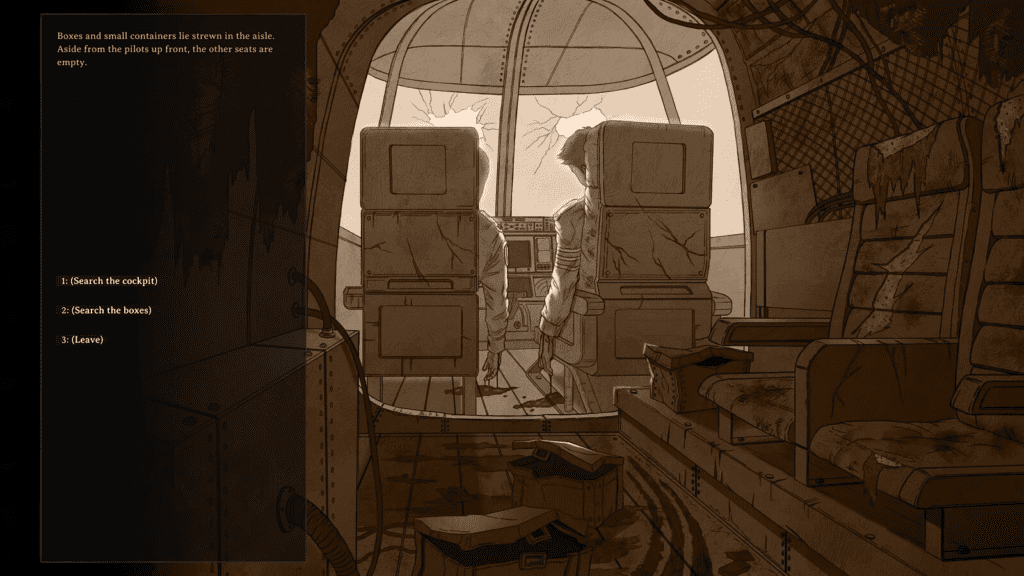
Story beats reminiscent to Pillars of Eternity break up the standard RPG formula.
You would expect that morality would influence your friends and your character in some way. My own observations contradict this. The intriguing premise of Broken Roads is swiftly set aside, and the significance of its speech choices is disregarded. When faced with a moral quandary, the quadrants you choose are just set dressing—colored font over typical good/bad/evil/neutral responses. When your actions have such a small effect on the plot, it’s difficult to get involved. You can support the doubtful mayor of the town or the equally dubious opposition in an election, but neither will significantly advance your personal growth. At the same time, your traveling companions blithely accept you assisting a blatantly corrupt woman or sullying a kind community leader. These people obviously have diverse ideas about morality, as evidenced by the varied responses you get when you ask them early on what makes a good leader. Members of your party would permanently leave the original Baldur’s Gate if you did something that went against their alignment. When you use a superweapon to blow a huge hole in a community, nobody here, 25 years later, shrugs their shoulders.
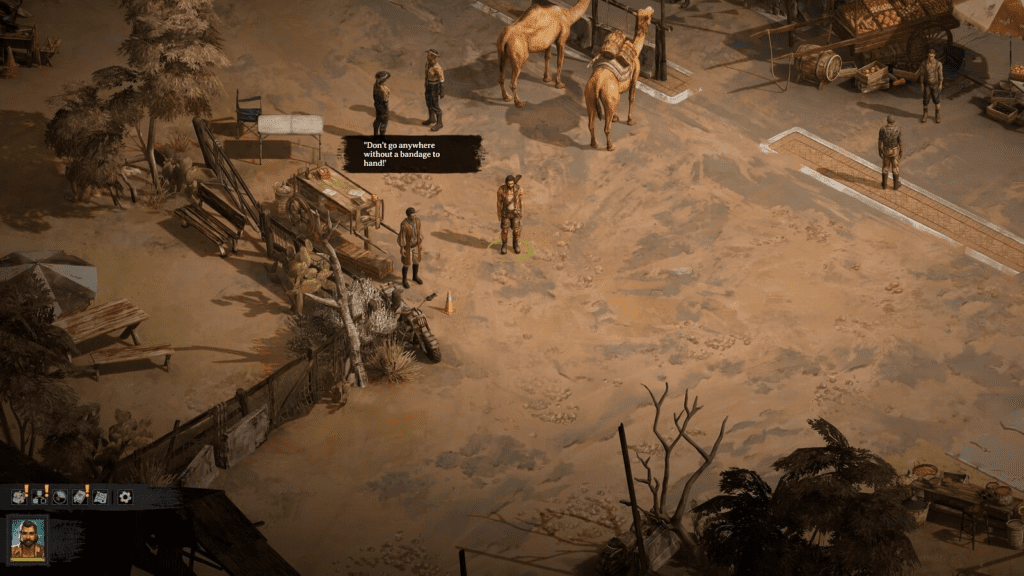
Life’s rule
Broken Roads does have some enjoyable moments when the humor breaks through the everydayness. Maybe you’re hiding a Monopoly dog from a bored local in a town game of hide-and-seek, or you’re breaking a guy out of jail with a saw smuggled in a vegemite sandwich. While navigating the map, “right bastards” like spiders and dingoes may randomly encounter you. Had this Australian humor persisted throughout, the quests could have been a little more tolerable. However, I wasn’t particularly interested in locating five books, collecting three possums, or doing any other mundane duties that were given to me to pass the time while playing.
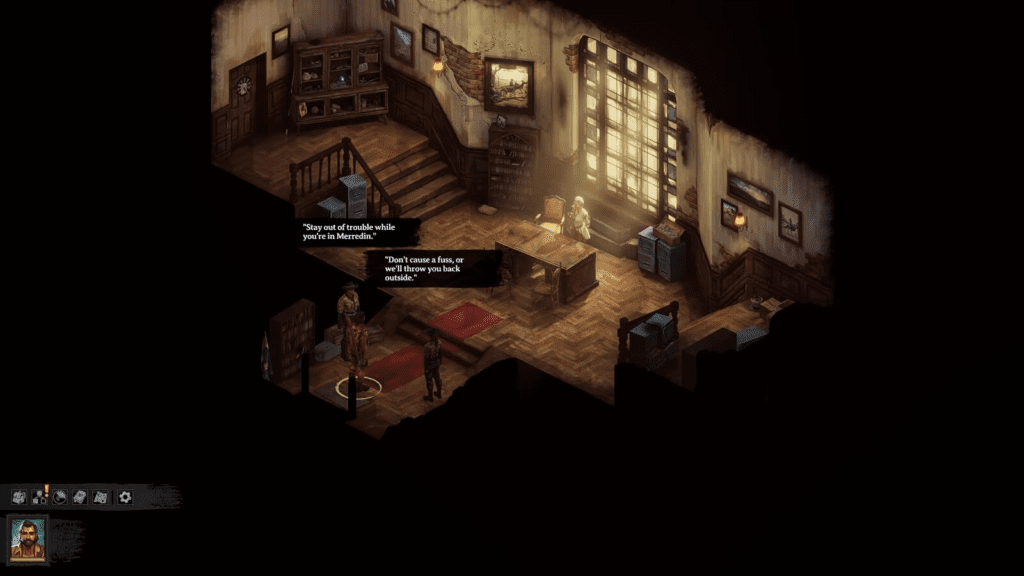
However, I have a VIP pass!
The flavor text doesn’t actually grow, so at first it’s hard to tell which of the many foods, weapons, and gadgets that traders are selling will be useful and which are merely window dressing. Must I purchase that toolbox? What purpose will it serve? What about those texts on philosophy? Are they significant? It’s up to you to determine what you might need and what can wait. If you didn’t start off with a lot of money, it might be okay, but if you had early doors, you might find yourself worrying over choices the developer probably wasn’t planning for. Schmoral Schompass: a moral compass. What possible function may this bunch of flowers have? In addition to standard quests, there are Ventures (a distinct kind of fetch quest) that make use of special things you purchase from traders and give to individuals you meet. It seems that the purpose of them is to reveal more backstory about the locals or your surroundings. But in terms of gameplay, they’re just too simple; you just wind up purchasing the exclusive item in every shop that sells it, and when you come across an NPC who wants it, it’s taken away from you instantly in return for experience points and extra conversation. These fetch quests are very subtle even in their “fetch” element.
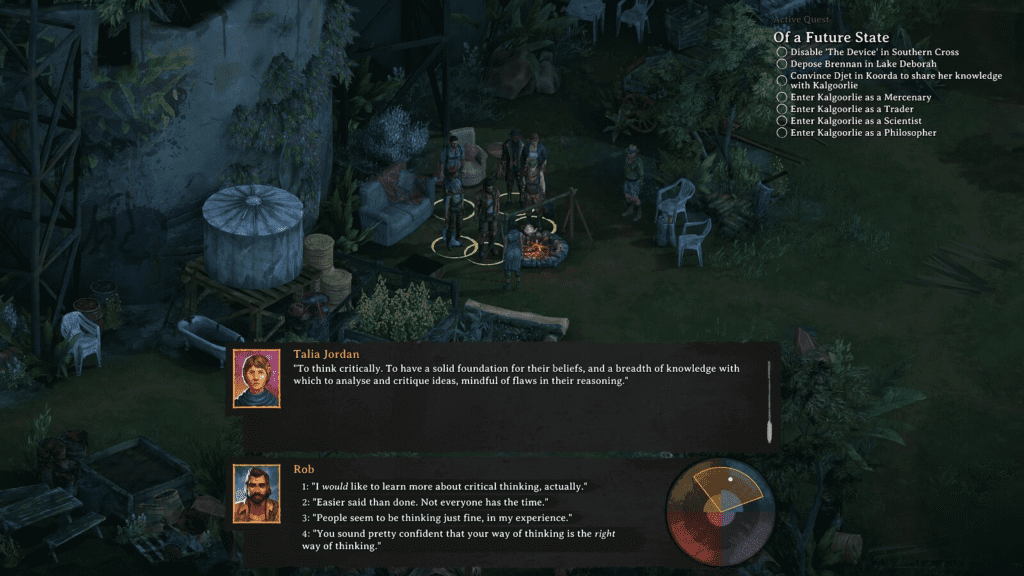
Though they are scattered throughout the game, philosophical ideas are rarely given a compelling narrative.
Despite the game’s release date being pushed back several months because to build quality issues, bugs still exist. Every quest is noted in the notebook with the same time of day. Sometimes navigation is a pain; you can’t start a conversation until your group is gathered around a target, even if that means that some members of the group took a detour and ended up partially off the map. I completed tasks that didn’t involve my active participation, like one that needed me to look up arcane facts in order to enter a settlement. I asked the guard to ask an earlier question (which he’d never asked me before), and somehow, after doing so, I got the correct answer as an option. This is how the guard let me in. Sure, success, but in a bewildering way.
At times, I would meet an NPC halfway across the map at a trigger location, even if they had since moved. Then, from miles away from my party, they struck up a conversation that made me feel as though I was shouting over a desert. While some NPCs had a chat symbol above their heads and responded, others just jumped right into the trade screen without saying anything, which felt inconsistent with the ones who introduced themselves. Larger problems persist, as when a possible party member you’re attempting to save shows up in your list of selectable companions even though you haven’t succeeded in saving him. This ends the rescue mission completely. Another time, I found a location and it locked the screen, preventing me from moving my group around the map to explore it until I loaded a save file.
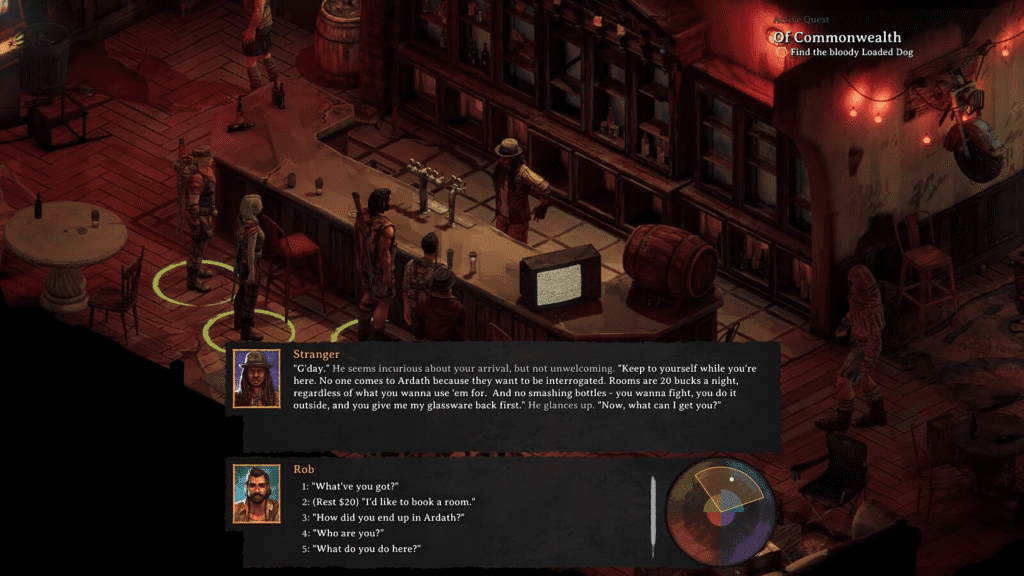
Until you speak with someone, they are all strangers.
I could probably be more understanding if I could explain that these were sporadic or even small problems. However, they add up, and when combined with the monotonous tasks, drab fighting, and sluggish navigation, the game becomes unenjoyable to play. Because of the distinct personality of Broken Roads, I genuinely wanted it to be better. The narrative and evocative prose captured my interest. Not quite as rapidly as Disco Elysium (though if you can discover another game that can capture my attention with just text, I’ll be your lifelong friend), but with a certain allure all its own. The NPCs and characters aren’t ridiculous clichés; rather, they’re nuanced representations of people struggling to survive in a harsh environment. Examples include a wide-eyed negotiator whose parents expelled her when she was a child, a set of prickly siblings, a young man seeking forgiveness, and a young, brash man. The Australian slang, which is translated for you as you mouse over words in the dialogue box, and their unremarkable voices all add to the scene, even though occasionally it doesn’t make sense (for example, “the sharpest tool in the shed” highlights “tool” as an incompetent person even though it doesn’t fit the idiom).
Now for the technical details: Broken Roads is sadly but fittingly named. Certain systems in this place beg for a more advanced and captivating vehicle. Though not game-breaking, the issues have a major negative influence on enjoyment, so the package as a whole needs to be fumigated in order to even get to that point. Maybe a Cyberpunk-level rework will have been done in a year to turn it around. It’s definitely not fair dinkum right now.
Review Overview
Gameplay – 80%
Story – 85%
Aesthetics – 75%
Content – 80%
Accessibility – 70%
Value – 85%
Overall Rating – 79%
Good

